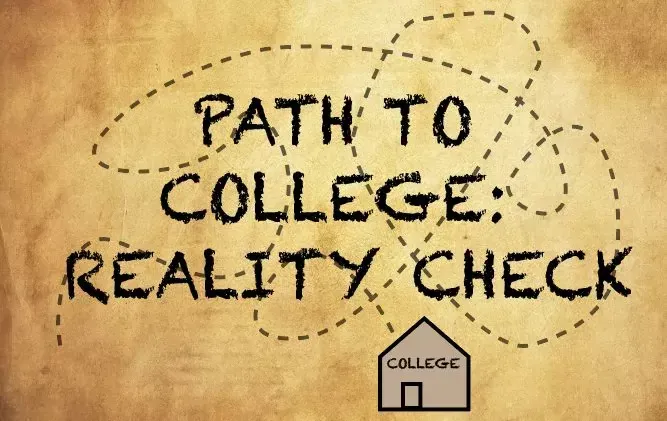What problem do you want to solve?
Shelly Humbach • April 21, 2020

As “stay at home” orders continue on for many states, you may find yourself with some extra time on your hands. Have you run out of puzzles, family game night getting old, have you reached the end of the internet? Maybe it’s time to think about some of life's big questions – like “what do you want to be when you grow up?”. But before you start there, consider this advice from Jaime Casap.
Jaime Casap is the Education Evangelist at Google. He promotes the power of technology and the web as tools to transform education. He’s also an author and sought-after speaker and he has some different ideas around choosing a career path. He says the question of “What do you want to be?” is the wrong question. What do you want to be leads you to pick a job that exists now. But things are changing rapidly – that job may not exist in the future. Instead, Jaime says to focus on the three questions below.
1. What problem do you want to solve?
2. How do you want to solve that problem?
3. What do you need to learn to solve that problem (knowledge, skills, and abilities)?
Check out this episode
of his video blog for more detail as he travels to several locations to talk about this idea. Fun tip – watch to the very end to see Jaime encounter a COVID appropriate piece of technology (even though this video was filmed a year ago).
Take Action
What problem do you want to solve? Start small with a problem you could tackle right now. It might not be your future career path but it’s a good exercise nonetheless. Think about the unique perspective you can bring and check out some online resources (YouTube videos, websites, or apps) that could help you build your skills. Maybe the problem right now is your mom’s cooking. If you solve that one – your family will thank you!

Sophomore year is the quiet workhorse of high school. It’s not flashy like junior year. It’s not celebratory like senior year. But it matters. A lot. Here’s your tight, no-nonsense checklist: Academic Rigor Check Is your student appropriately challenged? Honors? AP? IB? Dual enrollment? Colleges care about trajectory. Upward trends = good. Coasting = not so much. Grades This is a foundational transcript year. No “we’ll fix it later” energy. Strong sophomore grades make junior year pressure more manageable. Testing Plan (Light, Strategic) Consider a practice SAT/ACT in the Spring. No need to prep - you are looking for a baseline. Diagnostic only. Meaningful Activities Random clubs and sporadic community service? Hard pass. Encourage commitment, leadership, and genuine interest. Colleges want to see depth, not breadth. Summer Game Plan Catch up on sleep, hang out with your friends…….and one or two of: camps, jobs, volunteering, academic programs, internships, and job shadowing. Summer is for fun and also for showing curiosity or initiative. Relationship Building Teachers matter. Not for favors. For mentorship. Strong junior-year recommendations start with authentic sophomore engagement. Early College Exposure Casual visits. A local campus tour. Virtual info sessions. Start noticing size, setting, vibe. You’re gathering data, not making decisions. Financial Reality Check Run Net Price Calculators. Yes, now. Sticker shock is real. Know your numbers early to inform a great fit college list, and also so senior year isn’t a panic spiral. Executive Function Audit Time management. Organization. Study habits. If there are cracks, identify and work on them before junior year hits like a freight train. Mental Health Ambition is great. Burnout is not. Balance matters. Always. Sophomore year is about positioning. Quiet, strategic positioning. No drama. No frenzy. Just smart moves that compound over time. You’ve got this. And maybe put junior year on your vision board, cause it’s coming.

FINANCIAL FIT (a.k.a. Don’t Wreck Your Retirement) ☐ Have an honest family conversation about maximum annual college spend ☐ Run the college website Net Price Calculator for at least 5–8 schools ☐ Complete FAFSA prep (FSA IDs created for student + 1 parent) ☐ Separate dream schools from financially realistic schools ☐ Often sticker price ≠ net price COLLEGE LIST STRATEGY ☐ Confirm your student’s GPA/test scores in context of each school ☐ Build a balanced list: likely / target / reach / wildcard (no more than 10) ☐ Check which schools are test-optional vs test-preferred vs test-required ☐ Remove any school that makes zero financial sense (yes, even that one) CAMPUS VISITS (WORK SMART, NOT CUTE) ☐ Schedule official tours and ask about sitting in on a class ☐ Preview virtual tours before visiting ☐ Meet the regional admissions rep ☐ Visit or email the Financial Aid Office - Ask: “Based on our profile, what’s a realistic net cost?” TESTING (STRATEGY OVER PANIC) ☐ Decide SAT/ACT plan early (spring = ideal) ☐ Compare scores to each school’s middle 50% ☐ Submit scores only if they strengthen the application ☐ Support stress management - not score obsession TIMELINE & MOMENTUM ☐ Summer after junior year = essay drafting season (Godspeed) ☐ Create a senior-year application calendar ☐ Track deadlines: EA / ED / RD / Scholarships ☐ Keep senior-year grades strong (yes, colleges still care) PARENT REMINDERS (READ THIS TWICE) ☐ This is your student’s journey - guide, don’t micromanage ☐ Comparison is poison (especially with other parents). THIS. ☐ Prestige does not equal happiness, success, or ROI ☐ A financially sane college choice is a win

Juniors (and parents), take a breath. The college search can feel like trying to pick a favorite show on Netflix with 4,000 options and no remote. It’s overwhelming, and without a plan, nothing happens except mild panic and procrastination. Here’s how to cut through the noise: 1. Start close to home. Visit a small, medium, and large college in your state — even if none of them are on your actual list. You’re gathering data, not declaring allegiance. Pay attention to the basics: campus vibe, feeling of safety, surrounding town. Not every school sits in a picture-perfect bubble. (Looking at you, USC area.) Understanding what size and setting feel right is the foundation for building a meaningful college list. 2. Turn travel into opportunity. Heading out of town for Spring Break or a long weekend? Add a campus or two to the itinerary. You may think you’d never go to college in that region, but campus visits have a way of changing minds, or reinforcing them. Also, test the travel logistics. If getting from home to campus feels like planning a Mars mission, that’s worth knowing. 3. Make each visit count. Sign up for the official tour. But if you can skip the info session, do it. They’re often more marketing than substance, and the biggest takeaway is usually a free pen. Instead, ask Admissions if you can sit in on a class, tour the department you’re actually interested in, or talk with a professor. That’s where you get the real story. A bachelor’s degree is a major investment both financially and personally. Treat the process for what it is: a thoughtful evaluation of your options. The campus visit remains one of the most valuable tools you have. Use it intentionally, and you’ll make smarter choices with far less stress and a fantastic outcome.

College Application Season, a/k/a Application Hell, is upon us. Every year, my Colorado kids are pushed to meet the Colorado Free Application Days, which typically are in early October. This early deadline is both a blessing and a curse. Let me explain. The curse is that it’s early, and the pressure to complete applications and essays is intense. The blessing is that it’s early, which requires students to get their act together and finish their applications and essays. This dichotomy mirrors my experience working with teens. It is, you guessed it, both a blessing and a curse. Now, I realize I am being over-generalistic, but bear with me. The blessings are innumerable: they are bright, funny, kind, compassionate, and very, very aware. Of all kinds of stuff. Gen Z is fascinating in that they have the emotional intelligence of, say, a 45-year-old mother of three. They are informed and driven to act to impact injustices, locally and globally. And bonus! They can handle any of your persnickety tech issues without blinking an eye. Gen Z restores my faith in humanity, and for that, I am deeply grateful. And the curse? They cannot write. By the grace of God, each year, I have a handful of students who can write brilliantly, beautifully. But every year, that handful gets smaller, and along with that so does my faith in humanity. I firmly believe and bear witness to the fact that readers make writers. This is true for me. It is true for my children, and it’s just true. The rant? Devices and social media (I know, I am a broken record) are the culprit. Gen Z is growing up in a world of clickbait communication and constant distraction, fueled by addictive algorithms. The result - many have the attention span of a gnat. NO ONE IS READING ANYMORE. I don’t mean a headline. I mean a full article, let alone a book. Remember those? As a mother of three adults, functioning children, and a professional who has worked with hundreds of teens, please take heed. Read to your kids. Invite your kids to read to you. Their future depends on it.

In June, I hosted my annual Senior Essay Writing Workshop. This was the first in-person workshop since 2019. I bet you can guess why. I was elated to meet my students face-to-face after months, even years, of connecting through the screen. Imagine my surprise at their height, super-smiles, and warm laughter. Dang, it was wonderful. So, essentially, all my in-state seniors gather at my house for a three-hour intensive workshop on crafting a killer college essay. As I was preparing for the event, it occurred to me that I might be in competition with their PHONE. Classic directness (this is probably a character flaw) led me to inform my students and their parents, in advance, that this would be a no-phone gathering. My messaging went something like this, Important: Phones are placed in a basket at the door and retrieved at noon. No exceptions. Parents: If you need to reach your student during the workshop, text me directly at **********. Now, I am fully on board with the phone-free movement. I support it, advocate for it, and live it (I brilliantly quit all personal media last November). And I thought: my event, my rules. I was a little concerned about how this announcement would land. Turns out my concern was mainly about the parents. The kids? Not so much. In fact, research indicates that students crave phone-free learning environments. Suffice to say, the workshop was a smashing success. Not a single student pushed back against the policy. One poor soul forgot to retrieve her phone and left it sitting all alone in the basket. Not to worry, though. She didn’t get far before turning back to grab it. Here’s the truth: We don’t have to bow down to every technological whim or societal pressure. As adults, we know the phone is a problem, and it’s our job to foster healthy, happy individuals. So let's keep this momentum going. As Maya Angelou wisely said, “When you know better, do better.”

I work with incredible colleagues; collaborative, smart and supportive. They make me better and I am deeply grateful. Every year, Jennie Kent and Jeff Levy of Big J Educational Consulting share invaluable information regarding college admissions. Their research is impeccable and accurate and provides crucial data to help students and families make informed college decisions. Read on, share broadly and give a shout out to these generous professionals! Early Decision and Regular Decision Acceptance Rates Class of 2028 Domestic Undergraduate Need-Based and Merit Aid Class of 2028 In-State and Out-of-State Acceptance Rates Class of 2028 Financial Aid for International Noncitizens Class of 2028 International Noncitizens Acceptance Rate and Yield Class of 2028 Percentage of Students Submitting SAT and ACT Scores Class of 2028 Athletic Divisions and Conferences (partial list) Class of 2028 - NEW! These charts are visual, interactive, and easy to use. They make it possible to instantly sort using any column's metrics and to easily compare subsets of colleges. They are free and can be accessed at www.bigjeducationalconsulting.com/resources . From Jennie and Jeff: We hope you find these resources helpful in your work guiding students. Please feel free to share them broadly as long as they remain in their original unedited form. Permission is not granted to those charging a fee for their distribution. If you find an error after cross-referencing with an institution's Common Data Set, please contact us at info@bigjconsult.com . Thank you!




